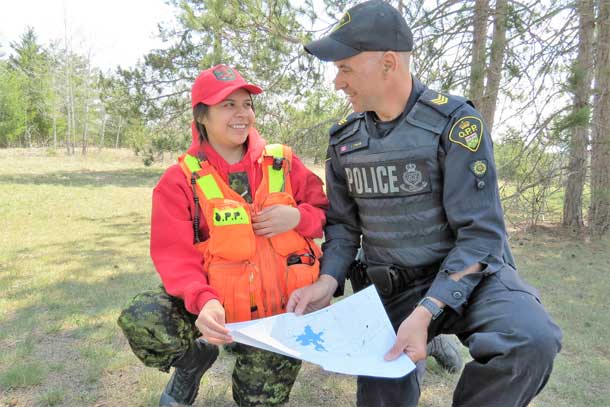

TIMMINS – The chiefs of the 49 First Nations in Nishnawbe Aski Nation were asked not to hesitate about calling the police when one of their community members goes missing.
The idea that they should wait 24 hours before alerting police that one of their community members may be in trouble is a myth, the chiefs were told at the spring NAN Chiefs assembly in Timmins.
“The 24-hour rule does not exist. Contact the police right away,” Sergeant Jamie Stirling, provincial search and rescue co-ordinator for the Ontario Provincial Police, said during a joint presentation with Lieutenant-Colonel Matthew Richardson, commanding officer of the Canadian Rangers in northern Ontario.
“When we are called into a community our job is to find the missing member of that community as quickly as possible and in the best possible condition,” Sergeant Stirling said. “What we are trying to do is find someone who is lost and whatever it takes to accomplish that mission we will do to achieve that.”
There have been instances where Chiefs, sometimes preferring to organize searches themselves, have been slow to contact the police and their delays have meant the full search and rescue resources of the police and the Canadian Armed Forces have been delayed in being implemented.
The first step to getting those considerable resources deployed is to contact the police, Sergeant Stirling said.
Under an agreement between the OPP and the Canadian Armed Forces the police can then request the assistance of the Canadian Rangers across the Far North of Ontario.
The OPP can bring to the community additional OPP officers, search dogs, marine and air support, and other resources. The Canadian Armed Forces can authorize the use of the Canadian Rangers with their specialized knowledge of their local territories and their military training and equipment. The military can also provide aircraft and helicopters from the search and rescue centre at Canadian Forces Base Trenton.
To help in searches the chiefs can provide a local building, such as the band office, a school, or the local police station to be used as a command centre by the Rangers. They can also arrange for fuel and other supplies to be made available for the Rangers to conduct their searches, he said.
“One of the biggest things the Rangers have is they are community members helping their communities in times of need,” Sergeant Stirling said.
Colonel Richardson said in an interview the opportunity to speak to the chiefs at the assembly was important.
“It allowed Sergeant Stirling and me to explain our procedures and dispel some of the myths around search and rescue, such as the 24-hour waiting period. That’s something you see on TV and people believe it’s real. It’s not. When somebody’s missing they need to be found now, especially up North given the weather and distances that may be involved.
“We are a service for the community and a tool for the chief to use. But to protect the missing person we have to make sure procedures are followed. The first thing to do is contact the police.”
(Sergeant Peter Moon is the public affairs ranger for the 3rd Canadian Ranger Patrol Group at Canadian Forces Base Borden.)
